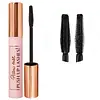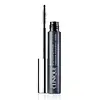Charlotte Tilbury Pillow Talk Push Up Lashes Mascara Versus Clinique Lash Power Mascara Long-Wearing Formula
What's inside
What's inside
 Key Ingredients
Key Ingredients

 Benefits
Benefits

 Concerns
Concerns

 Ingredients Side-by-side
Ingredients Side-by-side

Water
Skin ConditioningCI 77499
Cosmetic ColorantMicrocrystalline Wax
Emulsion StabilisingStearic Acid
CleansingCopernicia Cerifera Cera
EmollientGlyceryl Stearate
EmollientAcrylates Copolymer
Hydrogenated Vegetable Oil
EmollientButylene Glycol
HumectantRicinus Communis Seed Oil
MaskingStearyl Stearate
EmollientCI 77007
Cosmetic ColorantAminomethyl Propanol
BufferingCaprylyl Glycol
EmollientPhenoxyethanol
PreservativeGalactoarabinan
Sodium Dehydroacetate
PreservativeTocopheryl Acetate
AntioxidantLaurdimonium Hydroxypropyl Hydrolyzed Keratin
Skin ConditioningLaureth-21
CleansingBHT
AntioxidantWater, CI 77499, Microcrystalline Wax, Stearic Acid, Copernicia Cerifera Cera, Glyceryl Stearate, Acrylates Copolymer, Hydrogenated Vegetable Oil, Butylene Glycol, Ricinus Communis Seed Oil, Stearyl Stearate, CI 77007, Aminomethyl Propanol, Caprylyl Glycol, Phenoxyethanol, Galactoarabinan, Sodium Dehydroacetate, Tocopheryl Acetate, Laurdimonium Hydroxypropyl Hydrolyzed Keratin, Laureth-21, BHT
Water
Skin ConditioningAcrylates Copolymer
Kaolin
AbrasiveCopernicia Cerifera Wax
PEG-15 Glyceryl Stearate
EmulsifyingSilica
AbrasiveButylene Glycol
HumectantAlcohol
AntimicrobialHydrogenated Rapeseed Alcohol
EmollientBentonite
AbsorbentPolyvinyl Alcohol
Sucrose Distearate
EmollientStearic Acid
CleansingSimmondsia Chinensis Seed Oil
EmollientDimethicone
EmollientSimethicone
EmollientVp/Va Copolymer
Nylon-66
Tocopherol
AntioxidantAminomethyl Propanediol
BufferingAminomethyl Propanol
BufferingXanthan Gum
EmulsifyingChlorphenesin
AntimicrobialSodium Dehydroacetate
PreservativePhenoxyethanol
PreservativeCI 77491
Cosmetic ColorantCI 77492
Cosmetic ColorantCI 77499
Cosmetic ColorantCI 77891
Cosmetic ColorantCI 75470
Cosmetic ColorantCI 19140
Cosmetic ColorantCI 42090
Cosmetic ColorantCI 77007
Cosmetic ColorantCI 77163
Cosmetic ColorantCI 77288
Cosmetic ColorantCI 77742
Cosmetic ColorantCI 77289
Cosmetic ColorantWater, Acrylates Copolymer, Kaolin, Copernicia Cerifera Wax, PEG-15 Glyceryl Stearate, Silica, Butylene Glycol, Alcohol, Hydrogenated Rapeseed Alcohol, Bentonite, Polyvinyl Alcohol, Sucrose Distearate, Stearic Acid, Simmondsia Chinensis Seed Oil, Dimethicone, Simethicone, Vp/Va Copolymer, Nylon-66, Tocopherol, Aminomethyl Propanediol, Aminomethyl Propanol, Xanthan Gum, Chlorphenesin, Sodium Dehydroacetate, Phenoxyethanol, CI 77491, CI 77492, CI 77499, CI 77891, CI 75470, CI 19140, CI 42090, CI 77007, CI 77163, CI 77288, CI 77742, CI 77289
 Reviews
Reviews

Ingredients Explained
These ingredients are found in both products.
Ingredients higher up in an ingredient list are typically present in a larger amount.
Acrylates Copolymer is used as a film-forming agent and texture enhancer.
After applied, Acrylates Copolymer forms a thin film cover that helps skin feel more soft. It can help sunscreens become more water-resistant.
It is also used to make a product more thick.
Learn more about Acrylates CopolymerAminomethyl Propanol is used to adjust the pH of products. It is also used as a base to create other organic compounds. Having a balanced pH is important for protecting your skin.
Aminomethyl propanol is safe to use in cosmetics up to 1%. It is soluble in water.
Butylene Glycol (or BG) is used within cosmetic products for a few different reasons:
Overall, Butylene Glycol is a safe and well-rounded ingredient that works well with other ingredients.
Though this ingredient works well with most skin types, some people with sensitive skin may experience a reaction such as allergic rashes, closed comedones, or itchiness.
Learn more about Butylene GlycolThis pigment is called Ultramarine blue lazurite. It gives a saturated blue color, but can be used to create other colors as well.
According to the manufacturer, it is usually made from kaolin, sodium sulfate, sodium carbonate, sulfur, and charcoal.
Ci 77499 is also hydrated iron III oxide. It is created from mixing red and black iron oxides. This helps give shades of darkness to a product.
Iron III oxides are classified as inorganic chemicals for coloring.
Phenoxyethanol is a preservative that has germicide, antimicrobial, and aromatic properties. Studies show that phenoxyethanol can prevent microbial growth. By itself, it has a scent that is similar to that of a rose.
It's often used in formulations along with Caprylyl Glycol to preserve the shelf life of products.
This ingredient is a preservative with antimicrobial properties. It is the sodium salt of dehydroacetic acid.
It is especially effective at preventing bacterial and fungal growth in low concentrations.
Stearic Acid is a fatty acid. It is an emollient, emulsifier, and texture enhancer.
As an emollient, stearic acid helps soften skin. It aids the skin's protective barrier by preventing water loss. It also provides a gentle cleansing effect without stripping away natural oils.
Stearic acid may also be used to enhance the texture of products. It can add volume and stabilize ingredients such as water and oil. This can help water and oil ingredients from separating.
Sources of stearic acid include animal or vegetable fats/oils such as coconut or shea. It can be naturally found in butter, cocoa butter, shea butter, vegetable fats, and animal tallow.
This ingredient may not be Malassezia folliculitis, or fungal-acne safe.
Learn more about Stearic AcidWater. It's the most common cosmetic ingredient of all. You'll usually see it at the top of ingredient lists, meaning that it makes up the largest part of the product.
So why is it so popular? Water most often acts as a solvent - this means that it helps dissolve other ingredients into the formulation.
You'll also recognize water as that liquid we all need to stay alive. If you see this, drink a glass of water. Stay hydrated!
Learn more about Water